How to Create an AI Supplier Questionnaire for Vendors
In this guide, you’ll learn what AI supplier questionnaires require, sample questions, response strategies, AI’s role in simplifying the process, and proven ways to build trust and win more contracts.
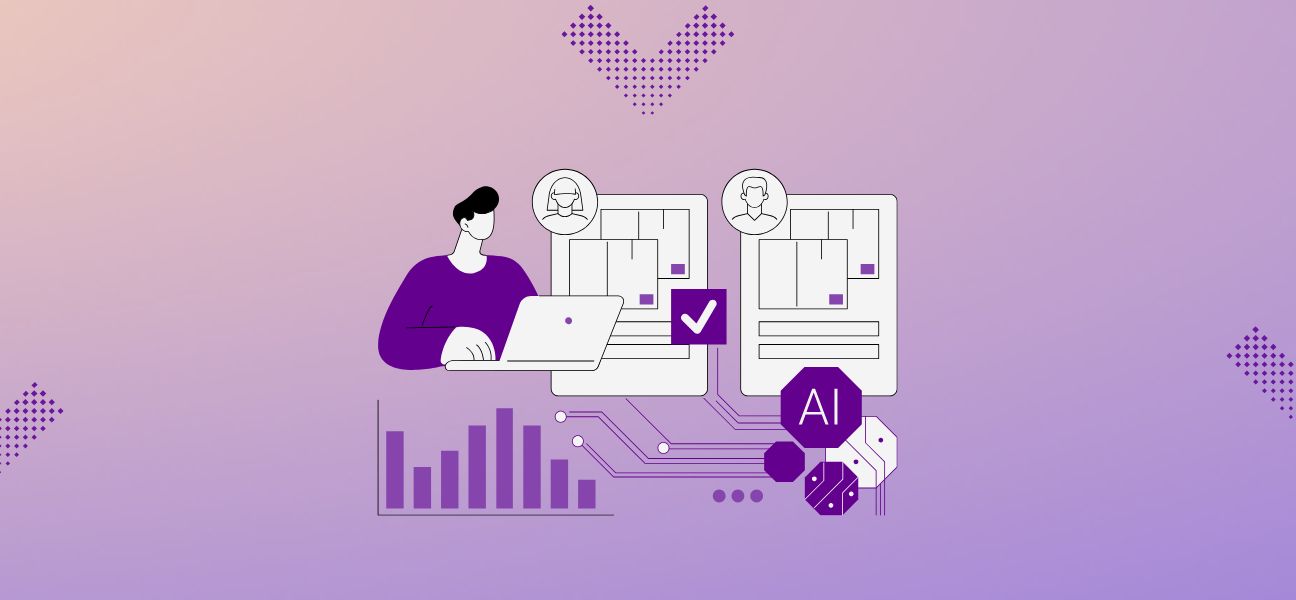
Are you struggling to meet rising buyer expectations in AI procurement?
Vendors today face growing requests for proof of security, compliance, and transparency, and the stakes are getting higher.
In fact, more than half of US procurement leaders plan tech investments in 2025, with 53% reporting a larger budget for these upgrades. It’s a sharp rise from last year’s 30% (Ardent Partners).
Complex AI supplier questionnaires are now routine, challenging sellers to provide clear, accurate details on how their AI tools handle data, fairness, and compliance. Mistakes or incomplete responses can delay deals and damage credibility, making preparation essential.
In this guide, you’ll learn what AI supplier questionnaires require, sample questions, response strategies, AI’s role in simplifying the process, and proven ways to build trust and win more contracts.
Key Takeaways
- AI supplier questionnaires are vital tools vendors face to prove compliance, security, and ethical use of AI. Well-prepared responses build trust and credibility with buyers, showing transparency and commitment to standards.
- Understanding questionnaire objectives helps vendors focus on key areas like data transparency, model governance, and ethical compliance. Core components often cover privacy protocols, bias mitigation, and support scalability, ensuring comprehensive evaluation.
- Effective management of questionnaires requires early collaboration, clear guidelines, and centralized knowledge sharing within vendor teams. These practices improve response accuracy and ensure timely submission.
- Common vendor challenges include handling complex technical details, balancing transparency with confidentiality, and meeting submission deadlines. Awareness and strategic planning help vendors avoid mistakes and fatigue.
- Utilizing AI tools accelerates drafting, improves content accuracy, keeps responses current, and enhances internal collaboration. Automation and analytics support higher quality, faster replies that increase vendor win rates.
What is an AI Supplier Questionnaire?
An AI supplier questionnaire is a structured set of questions aimed at evaluating AI products, systems, and the vendors who provide them. Buyers use these questionnaires in procurement processes to check a vendor’s approach to data privacy, model security, ethical use, and compliance with standards. By requiring detailed, written answers, these tools go beyond sales presentations and help buyers gather solid proof of how AI solutions really work and protect data.
For vendors, the questionnaire is more than a formality. It is central to due diligence, giving buyers an evidence-based way to spot risks and flag issues before contracts are signed. Each answer becomes part of a legal record and feeds into risk management, accountability, and ongoing supplier performance checks.
A strong questionnaire process protects vendors and buyers and sets expectations early. This foundation supports stronger business partnerships and a smoother, faster path to decision-making. Now, let’s discuss why these questionnaires matter to vendors specifically.
Why AI Supplier Questionnaires Matter for Vendors?
With changing priorities, vendors must meet buyer demands for transparency, compliance, and trust. AI supplier questionnaires serve as a key tool to establish these qualities.
Here are 5 reasons why these questionnaires matter for vendors:
- Build Transparency: Questionnaires require vendors to share detailed info about AI models, data use, and governance. This openness reduces buyer doubts and helps vendors prove their claims about security and performance.
- Ensure Compliance: Vendors must show adherence to industry regulations and standards. Accurate AI questionnaire responses demonstrate commitment to laws like GDPR, helping avoid legal risks and delays in contract approval.
- Strengthen Trust: Providing thorough and accurate answers creates confidence. Buyers view vendors as reliable partners ready to address risks and challenges openly.
- Gain Competitive Edge: Vendors who respond quickly and clearly stand out. Well-prepared AI questionnaires show professionalism and readiness, increasing chances to win deals.
- Support Risk Management: Questionnaires create an auditable record of vendor capabilities. It minimizes surprises and builds accountability throughout the partnership lifecycle.
Meeting questionnaire expectations is essential to secure contracts and build lasting buyer relationships. But what are the key objectives your AI supplier questionnaire should cover to maximize impact?
Key Objectives of an AI Supplier Questionnaire
An AI supplier questionnaire aims to provide buyers with clear, comprehensive insights into a vendor’s AI capabilities. For vendors, understanding these objectives helps in crafting accurate, thorough responses that meet buyer expectations and ease approval processes.
Here are a few core objectives your AI supplier questionnaire addresses:
- Transparency on Data Use and Model Governance: AI Questionnaires require vendors to disclose how they collect, process, and secure data. Transparency around model design, updates, and monitoring builds buyer confidence and shows your commitment to responsible AI management.
- Assess Compliance with Security and Ethical AI Standards: Buyers need proof that vendors follow regulations like GDPR and implement ethical AI practices. Your AI questionnaire should demonstrate adherence to industry laws, data privacy norms, and bias reduction strategies.
- Evaluate Performance and Reliability: Questionnaires probe vendor performance metrics, uptime guarantees, and quality assurance processes. Highlight your ability to meet service levels, ensure accuracy, and sustain consistent AI output.
- Support and Scalability: Vendors must show how their AI solutions can scale with growing demand and how support is provided. It includes response times for issues, upgrade paths, and resource availability.
- Risk Management and Accountability: AI questionnaires assess risk controls such as audit logs, incident responses, and vendor accountability policies. Clear documentation of these securities reassures buyers that risks are managed effectively.
Addressing these objectives thoroughly positions your offerings as trustworthy and capable. Next, let’s outline the core components you should include in your AI supplier questionnaire to cover these objectives in detail.
Core Components to Include in Your AI Supplier Questionnaire
A well-structured AI supplier questionnaire includes key components covering essential areas of vendor capabilities. Understanding these helps vendors prepare clear, compliant, and complete responses that match buyer expectations.
Here are 5 essential components every AI supplier questionnaire includes:
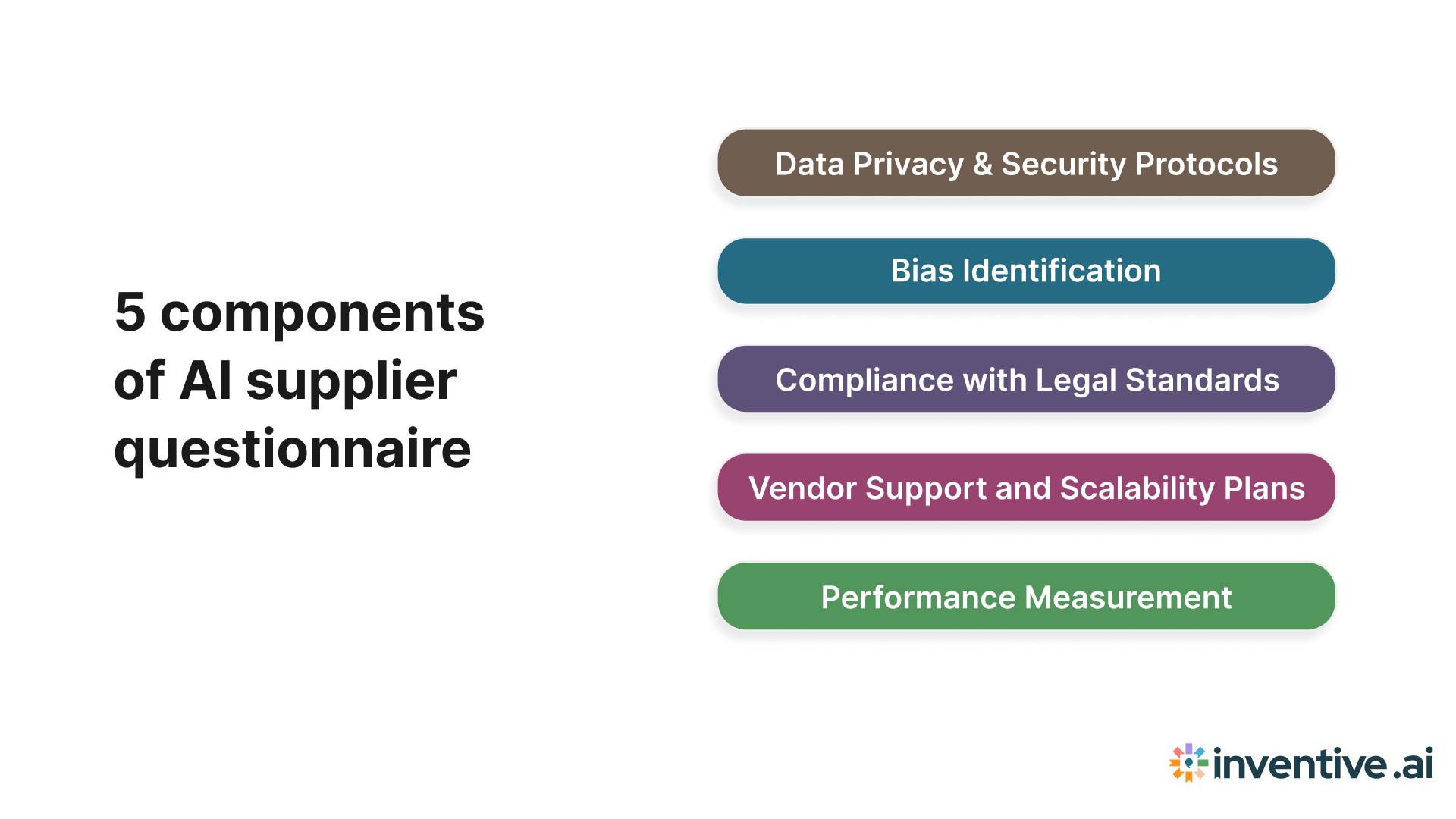
- Data Privacy and Security Protocols: Vendors must explain how they protect data through encryption, access controls, secure storage, and data retention policies. Demonstrating strong security ensures that buyer information stays safe and builds confidence in your AI solutions.
- Bias Identification and Mitigation Strategies: Buyers want assurance that AI systems avoid unfair outcomes or discrimination. Vendors should describe methods used to detect, measure, and reduce bias during model training and ongoing evaluation. This commitment secures vendor reputation and compliance.
- Compliance with Legal and Ethical Standards: Vendors need to confirm adherence to laws like GDPR and ethical guidelines for AI use. Showing governance structures for regulatory updates and ethical review reassures buyers that your offering meets current standards.
- Vendor Support, Maintenance, and Scalability Plans: Clear information on support availability, issue resolution timelines, and system scalability is vital. Buyers expect your AI solution to grow with their needs and receive timely maintenance for smooth operations.
Also Read: Customer Support RFPs: 10 Essential Steps for a Winning Vendor Selection
- Performance Measurement and Reporting: Including metrics on AI accuracy, uptime, and auditability helps buyers evaluate ongoing effectiveness. Sellers who provide transparent performance data build trust and create opportunities for improvements.
These components frame a thorough evaluation of your AI capabilities and trustworthiness. Now, let’s discuss some sample questions vendors should expect related to these core areas.
15 Sample Questions Vendors Should Expect
AI supplier questionnaires include a range of questions designed to reveal a vendor’s technical, security, and operational strength. Vendors who understand typical questions can prepare clear, concise, and accurate answers.
Below is a table detailing 15 key questions vendors should expect. Each question comes with a brief explanation of its intent, what answers buyers seek, and guidance on how vendors should respond.
Understanding these questions and preparing precise responses can greatly improve a vendor's credibility and speed up procurement decisions.
How to Respond to Questions About LLM-Powered Solutions
As LLM-powered AI solutions become more common, vendors must be ready to address key questions. Here's how to respond succinctly:
Next, let’s cover the tips on distributing and collecting questionnaire responses efficiently to maintain high completion rates and data quality.
7 Best Practices for Managing Questionnaire Responses Internally
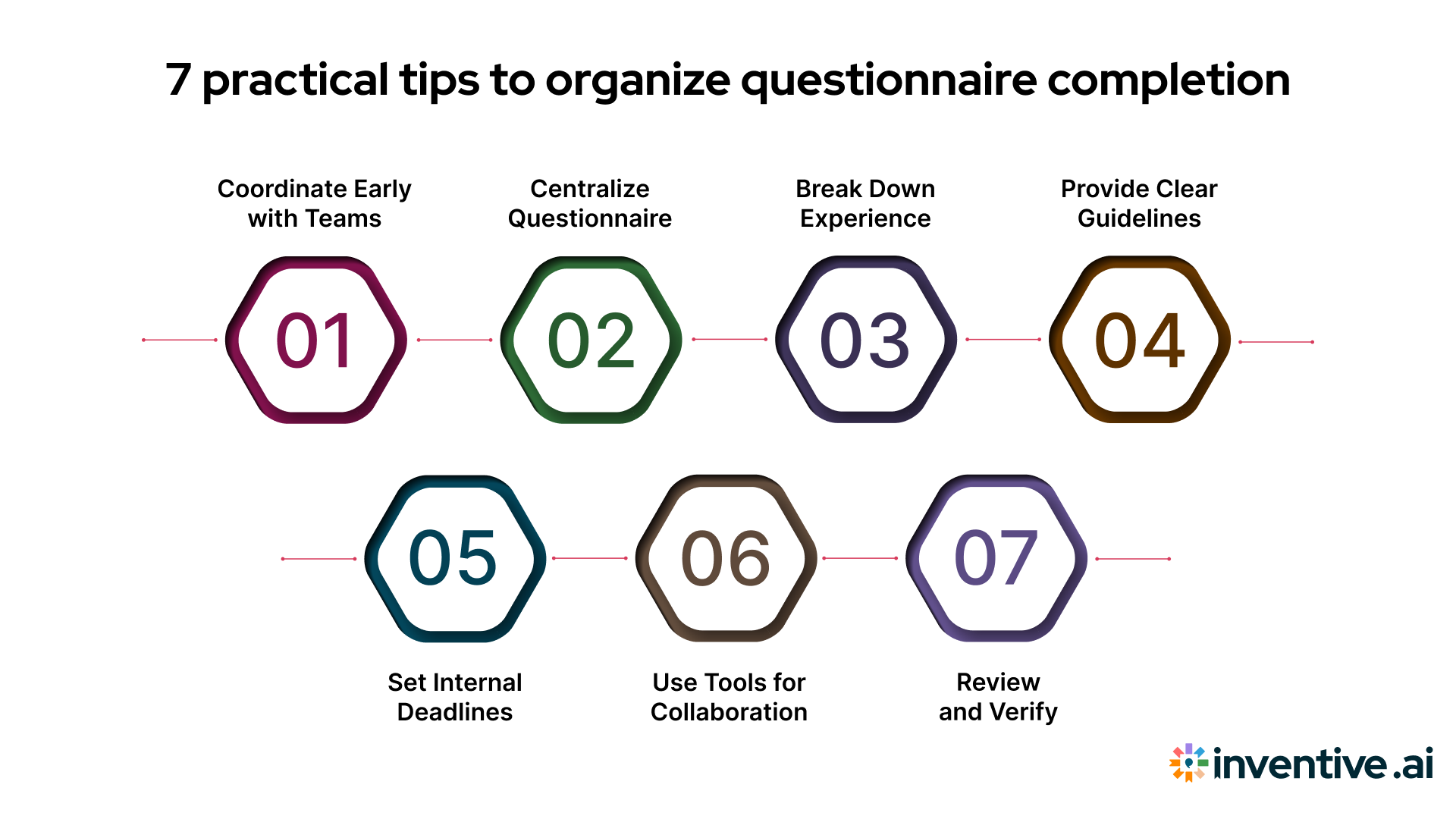
Vendors often face challenges managing AI supplier questionnaires efficiently. Handling multiple questionnaires, involving various teams, and meeting deadlines can be devastating.
According to a 2025 report on third-party risk management, 87% of organizations wait longer than 4 days to receive a response from vendors after sending questionnaires, with 56% waiting more than a week. The average vendor response time is about 12 days, which can significantly delay procurement decisions.
Having a clear approach to distributing the questions internally and collecting reliable responses ensures accuracy and timely submission.
Here are 7 practical tips vendors should follow to organize questionnaire completion effectively:
- Coordinate Early with Teams: Identify who owns each question area and communicate deadlines clearly. Early coordination ensures all inputs are collected without last-minute pressure.
- Centralize Questionnaire Documents: Store all questionnaire files and responses in one shared location accessible to all contributors. Centralization prevents lost information and confusion.
- Break Down Questions by Experience: Assign specific questions to relevant departments such as legal, compliance, IT, or product teams to gather precise answers.
- Provide Clear Internal Guidelines: Make sure everyone understands response expectations, formats, and documentation standards to maintain consistency.
- Set Internal Deadlines Ahead of Buyer Due Dates: 84% of initial assessments require follow-up actions, often adding more time. It shows that timely, well-organized questionnaire responses are critical to avoid lost opportunities and improve buyer trust. So, it’s better to establish earlier internal submission milestones to allow time for review, revision, and approval.
- Use Collaboration Tools: Consider shared documents, project management software, or messaging platforms to keep everyone aligned and track progress in real time.
- Review and Verify Before Submission: Conduct a final quality check to ensure completeness, accuracy, and compliance with buyer requirements.
Following these vendor-focused tips helps avoid delays and enhances the quality of AI supplier questionnaire responses. Now, let’s cover methods to analyze questionnaire results effectively for better decision-making.
How to Analyze AI Supplier Questionnaire Results?
Once vendors submit AI supplier questionnaires, understanding how buyers analyze those responses offers valuable insight. Knowing what buyers look for helps vendors customize answers to meet evaluation criteria and avoid common pitfalls. Effective analysis focuses on identifying strengths, gaps, risks, and overall fit.
Here are a few key ways buyers analyze questionnaire results, explained for vendors to grasp and align with:
- Establishing a Scoring Matrix: Buyers convert qualitative answers into scores using weighted criteria like security, compliance, and performance. Vendors can anticipate this by providing clear, measurable evidence rather than vague claims.
- Flagging Red Flags: Responses that lack detail, show non-compliance, or avoid sensitive questions trigger alerts. Vendors should be thorough and transparent to reduce the chance of being flagged.
- Comparing Vendor Responses: Buyers benchmark vendors against peers in areas such as support, scalability, and governance. Vendors benefit from differentiating their offerings with concrete data and case examples.
Consider reading our Complete Guide to Vendor Selection Procedure Steps
- Identifying Risk Levels: Buyers assess operational, security, and ethical risks from responses. Highlighting formal risk mitigation steps and audits reassures buyers and improves scores.
- Summarizing Results for Decision Making: Comprehensive scorecards and summaries cut through complexity to present vendor strengths and weaknesses clearly. Vendors should aim for clarity and consistency to aid positive scoring.
Understanding these analysis methods enables vendors to craft targeted, strong responses that improve buyer confidence and speed contract wins. Next, there are common challenges vendors face when completing AI supplier questionnaires and how to manage them.
Common Vendor Challenges with AI Supplier Questionnaires
Vendors frequently encounter obstacles when completing AI supplier questionnaires. Understanding common challenges helps vendors prepare better and submit stronger responses.
Here are some challenges vendors face and ways to overcome them:
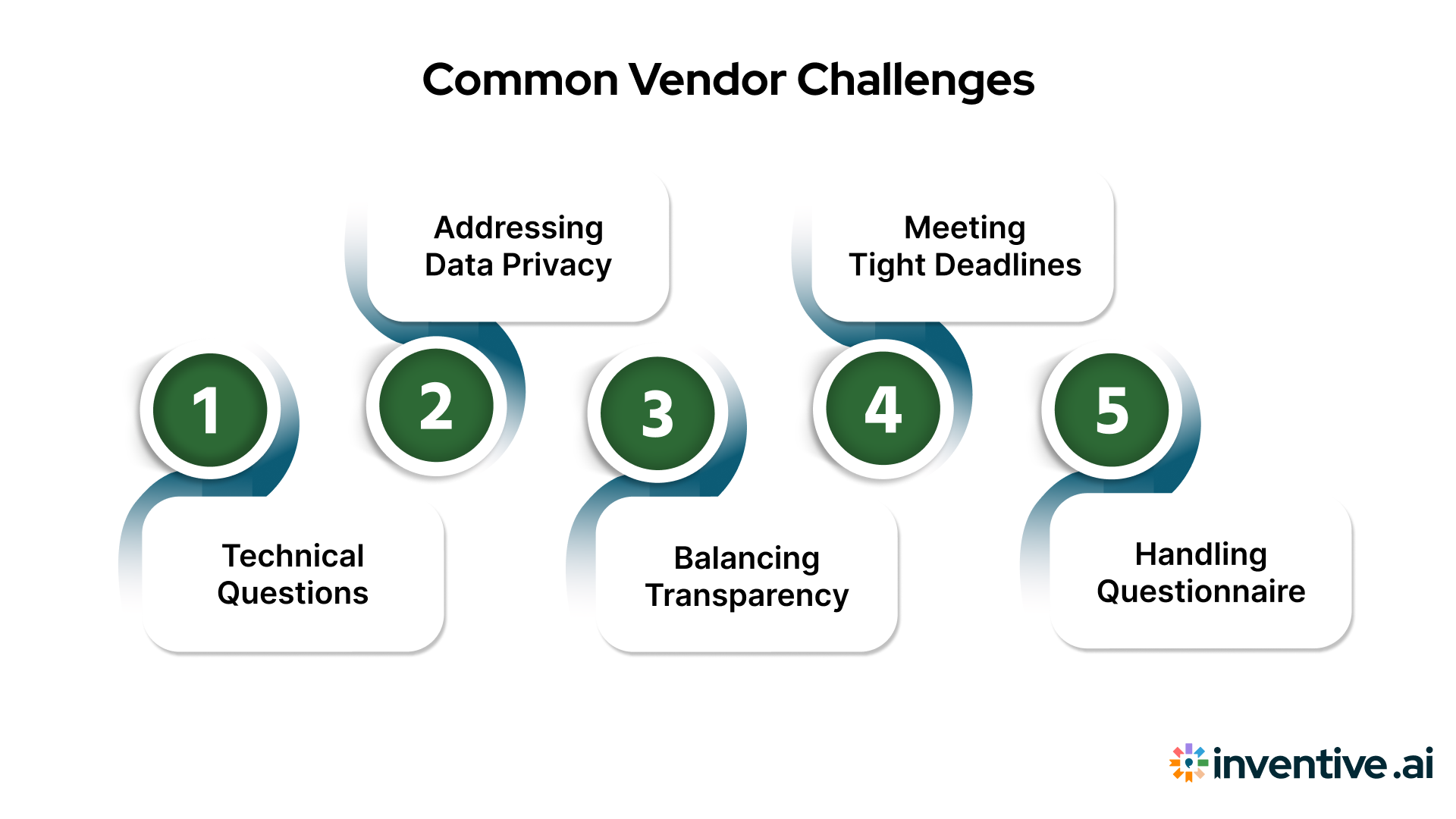
- Managing Complex Technical Questions: AI questionnaires often include detailed technical queries that require input from multiple teams. To avoid confusion, vendors should assemble a cross-functional team early, including IT, compliance, and legal experts, ensuring accurate and consistent answers.
- Addressing Data Privacy and Security Concerns: Vendors may struggle to clearly communicate security protocols or privacy compliance. Maintaining detailed documentation and standard templates for policies helps vendors provide precise, confident responses.
- Balancing Transparency with Confidentiality: Vendors worry about oversharing sensitive information. The solution lies in sharing enough to demonstrate compliance and capability while protecting proprietary details through non-disclosure agreements or summaries.
- Meeting Tight Deadlines: Time constraints can cause rushed or incomplete responses. Vendors should set internal deadlines well before buyer due dates and use project management tools to track progress efficiently.
- Handling Questionnaire Fatigue: Repeated, lengthy questionnaires cause respondent fatigue. Vendors can simplify efforts by maintaining an updated master questionnaire repository, allowing for easy reuse and quicker updates.
By anticipating and proactively addressing these challenges, vendors can improve response quality and build stronger buyer trust. Now, let’s see how AI technology can assist vendors in managing and completing these questionnaires more effectively.
How AI Can Help with AI Supplier Questionnaires?
AI technology offers powerful tools to simplify and improve the supplier questionnaire process for vendors. It automates data retrieval, speeds up response drafting, and improves accuracy. Understanding these advantages allows vendors to meet buyer expectations efficiently and consistently.
Here are 5 ways AI can support vendors in managing AI supplier questionnaires effectively:
- Automated Data Extraction: AI can scan existing documents, contracts, and policies to pull relevant information quickly. It reduces manual search effort and ensures consistent, error-free responses that align with verified data.
- Intelligent Draft Generation: AI-powered tools create draft answers based on available knowledge. Vendors save time by reviewing and refining rather than writing from scratch, speeding up questionnaire completion.
Must Read: AI Agents for Security Questionnaire Automation
- Compliance Monitoring: Automated intelligence continuously checks responses against evolving regulations and standards, flagging gaps or outdated info. Vendors stay current, reducing risk of non-compliance and last-minute corrections.
- Collaboration Enhancement: Such platforms facilitate better teamwork by organizing questions, tracking progress, and allowing real-time commenting. It simplifies communication and ensures everyone contributes timely inputs.
- Insightful Analytics: AI analyzes completed questionnaires to identify common weaknesses, improve future answers, and benchmark against competitors. Vendors gain actionable insights for ongoing improvement.
Utilizing AI in these ways helps vendors deliver high-quality, timely responses while reducing workload. Even recognized like Inventive AI specifically supports vendors through this process.
How Inventive AI Supports Vendors in Creating Effective AI Supplier Questionnaires?
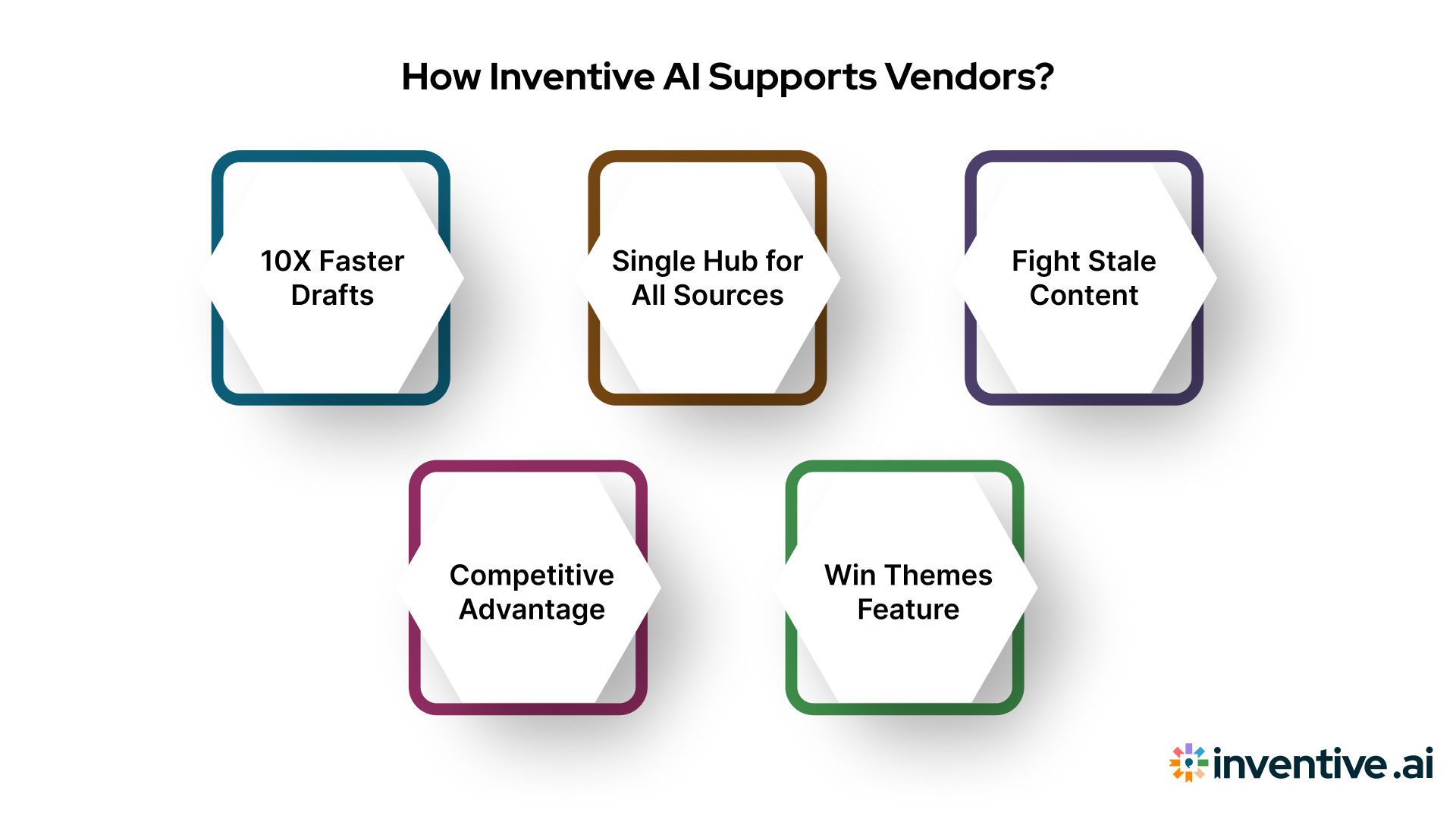
Inventive AI is an AI-driven platform designed to help vendors respond to AI supplier questionnaires faster and more accurately. It centralizes knowledge, automates drafting, and ensures content freshness.
Vendors often raise concerns around productivity, frequent errors, and weak proposals. Inventive AI came up with an all under one roof approach to ultimately increase vendor’s chances of winning contracts. Here are a few of those potential features:
- 10X Faster Drafts With Highly Accurate Responses: Inventive AI’s AI-powered response software generates initial drafts 10 times faster, using your internal knowledge sources. It lets your team focus on refinement and collaboration instead of starting from scratch, cutting weeks from response timelines without sacrificing accuracy.
- Single Hub for All Your Knowledge Sources: All relevant documents, past RFPs, policies, and Q&A reside in one centralized location. Integrations with tools like Google Drive and SharePoint keep your knowledge base organized, reducing time spent searching and preventing outdated or conflicting content use.
- Fight Stale Content With AI Content Manager: Our AI Content Manager flags outdated or conflicting material across sources. This proactive content management ensures that your responses are always based on fresh, verified information, minimizing errors and last-minute corrections.
- Higher Productivity & Competitive Advantage: Inventive AI’s AI RFP agents helps with competitor research, brainstorming, and compliance management. These automation features boost your team’s efficiency and give you an edge with insightful, tailored responses.
- Win Themes Feature: The AI-driven software identifies gaps in your responses and pulls information from various sources like Slack, emails, and calls. It ensures comprehensive, client-focused answers, increasing your chances of closing deals by addressing buyer needs fully.
Inventive AI combines speed, accuracy, and strategic content management to transform the way vendors handle AI supplier questionnaires, leading to faster, better, and more confident proposals.
Conclusion
AI supplier questionnaires play an important role in vendor selection and compliance. They are structured tools that help buyers assess a vendor's AI capabilities, data handling practices, and overall risk. For vendors, crafting thorough, accurate responses is crucial to showcase transparency, reliability, and alignment with regulatory demands.
Key objectives of AI supplier questionnaires include ensuring transparency on data use, evaluating model governance, and confirming compliance with security and ethical standards. Core components cover privacy protocols, bias mitigation, and scalability plans. Vendors benefit from best practices like early collaboration, centralized document management, and clear internal guidelines to improve response quality and timeliness.
Common challenges vendors face include managing complex technical questions, balancing transparency with confidentiality, and meeting tight deadlines. Many struggle with questionnaire fatigue or unclear expectations. Using AI tools can simplify the process, automate drafting, flag stale content, and improve productivity, helping vendors avoid pitfalls and increase win rates.
Frequently Asked Questions
1. What is the main purpose of an AI supplier questionnaire?
It helps buyers evaluate vendor capabilities in AI, focusing on data security, compliance, and ethical practices. Vendors provide structured, evidence-backed answers that prove transparency, risk management, and performance. This formal process builds trust and supports objective, auditable vendor assessments.
2. How detailed should my questionnaire responses be?
Responses should be clear and thorough, addressing each question directly with supporting documents or examples where possible. Avoid vague or overly technical answers. Detailed, accurate replies demonstrate professionalism and help buyers confidently assess your AI capabilities.
3. What if I don’t know the answer to a question?
If uncertain, explain your current approach or planned improvements honestly. Avoid guessing. You can also flag questions for follow-up after internal review. Transparency about gaps can build trust if paired with proactive mitigation plans.
4. Can AI tools help with questionnaire responses?
Yes, AI tools can automate drafting, pull answers from documents, and check compliance. They speed up responses and improve accuracy by reducing manual errors, helping vendors handle complex questionnaires efficiently.
5. How long does it typically take to complete an AI supplier questionnaire?
Completion time varies but usually ranges from a few days to several weeks, depending on questionnaire complexity and internal coordination. Starting early and involving relevant teams ensures timely, comprehensive responses that meet buyer deadlines.

90% Faster RFPs. 50% More Wins. Watch a 2-Minute Demo.
Understanding that sales leaders struggle to cut through the hype of generic AI, Mukund focuses on connecting enterprises with the specialized RFP automation they actually need at Inventive AI. An IIT Jodhpur graduate with 3+ years in growth marketing, he uses data-driven strategies to help teams discover the solution to their proposal headaches and scale their revenue operations.
After witnessing the gap between generic AI models and the high precision required for business proposals, Gaurav co-founded Inventive AI to bring true intelligence to the RFP process. An IIT Roorkee graduate with deep expertise in building Large Language Models (LLMs), he focuses on ensuring product teams spend less time on repetitive technical questionnaires and more time on innovation.

.jpeg)
